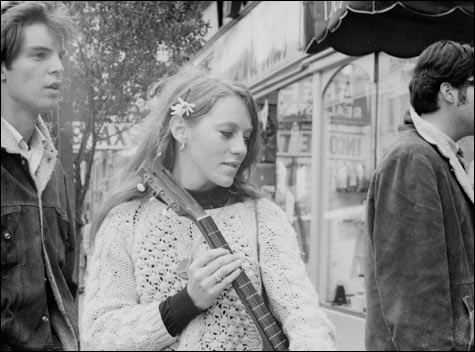
REEFER, TIE-DYE, AND PETULIE: Well, yes, but also a grassroots spiritual evolution. |
The Greatest Generation didn’t go quietly. It left in its wake a monument of popular books, films, and TV specials worshipping its world-redeeming exploits, but very little of that material ventures deeper than the self-congratulatory. To believe the media legacy, everything the Depression/WW2 crowd did was strong and good. To hear them tell it, the goddamn Battle of the Bulge, with its 19,000 American dead, was some sort of heroic joy ride. Now, the cohort saddled with the nickname Boomer Generation (that would be my generation) is about to infest the culture with a quarter-century of its own reminiscences. And that could be very embarrassing.
But PBS’s American Experience gets things off to a no-shit start this Monday, April 23, at 9 pm on WGBH by claiming the history-film rights to the Summer of Love. And it is an honest and clear-headed documentary. Yes, it gives the participants credit for brave idealism and devotion to social change, but it admits the ugly stuff that surrounded the times — the ODs and the VD and the hypocrisy of hippie poseurs — as well. It’s like . . . well, the truth for a change.
Which is refreshing, because a Summer of Love whitewash would be tragic. (Tell it like it is, indeed.) Then again, some measure of complimenting is long overdue, and so a little truth sorting is in order. The reputation of San Francisco’s fabled 1967 alternative-culture explosion has suffered mightily at the hands of revisionists and apologists and mass-market merchandisers, who’ve portrayed it as either a childish caprice or a human disgrace. But whatever frivolity and tragedy accompanied it, the Summer of Love was the product of a genuine grassroots spiritual evolution, and PBS deserves praise for pointing that out — just in case the audience fell for the story that it was all about reefer, tie-dye, and petulie.
Of course, hippies virtually begged to be misunderstood. What was the wider world to think of a bunch of bright, educated young people in painted faces and clown clothes prancing around antically unemployed and intoxicated? Never let it be said that ’60s youth lacked cultural literacy or a sense of irony. They never failed to find the humor in peace, love, and understanding and never lacked for showy and sophisticated ways of expressing it — so their sincerest of constructive beliefs often ended up sounding like jokes. See, that’s what made them hip, fool. And Summer of Love’s writers/producers, Dale Golgin and Vicente Franco (Daughter from Danang), understand this distinction.
Which means that the saga, as presented in the film, rings uncannily true. In the mid 1960s, the coming of age of a glut of well-educated Cold War children corresponded with both the introduction of LSD and the expansion of the Vietnam War. Whether psychedelics really altered the minds of Tim Leary’s devotees or simply exposed them to what might be called a “positive traumatic experience,” people returned from acid trips seeing the world differently from their “straight” peers. And around 1966-’67, the vanguard of that shared visionary experience coalesced in San Francisco — specifically in a working-class neighborhood near the intersection of Haight and Ashbury Streets.